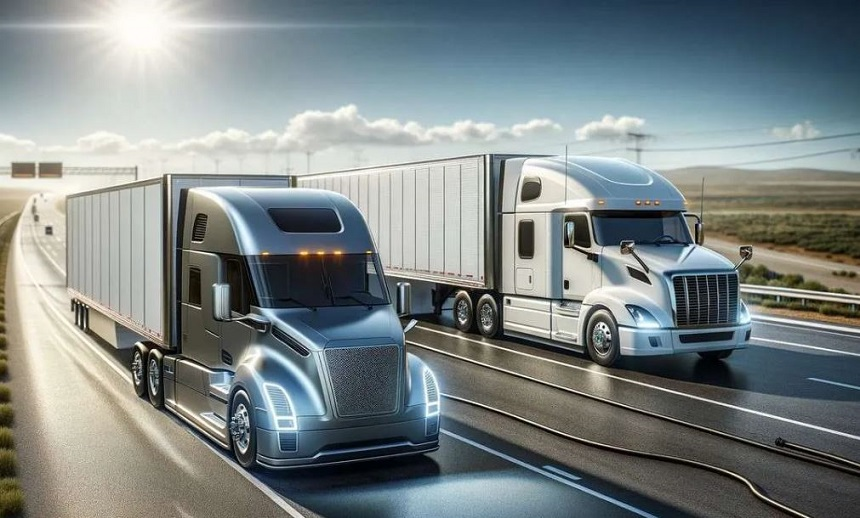27
May
Electric Trucks vs. Traditional Trucks: A Cost-Benefit Analysis
Are you looking to make a switch from traditional trucks to electric trucks? Before deciding, it's significant to conduct a cost-benefit analysis. Electric trucks are gaining popularity as companies strive to reduce their carbon footprint and lower operating costs. In this blog, let’s delve into the advantages and disadvantages of electric trucks compared to traditional trucks, helping you make an informed choice.
When it comes to cost, electric trucks have a higher upfront price tag but significantly lower operating costs. With no fuel costs and reduced maintenance requirements, electric trucks can provide substantial long-term savings. In addition, they are environmentally friendly, producing zero emissions and reducing noise pollution.
However, there are certain factors to consider. Electric trucks have limitations such as range constraints and the availability of charging infrastructure, which can pose challenges for long-haul trips. Weight limitations may also impact their load capacity. Traditional trucks, on the other hand, possess a long-range and well-established refueling infrastructure.
By weighing the pros and cons, you can determine which type of truck best suits your business needs and budget. So, let's dive in and explore the cost-benefit analysis of electric trucks versus traditional trucks.
Cost Benefits Analysis of Electric Trucks
Despite the higher upfront cost, electric trucks offer significant long-term cost benefits. The absence of fuel costs is one of the main advantages. While electricity is cheaper than diesel or gasoline, businesses can save considerable money on fuel expenses. Over time, these savings can offset the initial investment and result in substantial cost savings.
Moreover, electric trucks require less maintenance compared to traditional trucks. With fewer moving parts and no need for oil changes, businesses can reduce their maintenance expenses. It can lead to additional cost savings and increased efficiency.
In addition, electric trucks may qualify for tax incentives and grants offered by governments and local authorities. These financial incentives can further reduce the overall cost of purchasing and operating electric trucks, making them an attractive option for businesses.
Cost Drawbacks of Electric Trucks
Despite the cost benefits, there are certain drawbacks to the cost associated with electric trucks. As mentioned earlier, electric trucks have a higher upfront price tag when compared to traditional trucks. It can be a barrier for businesses with limited budgets or looking for a more affordable option.
Another cost drawback is the need for charging infrastructure. While the number of charging stations is increasing, it may still be limited to certain areas. Businesses may need to invest in setting up their charging infrastructure, which can add to the initial cost.
Furthermore, the cost of replacing batteries can be significant. Electric truck batteries have a limited lifespan and will eventually need to be replaced. The battery replacement cost can vary depending on the size and type of battery, and businesses should factor this into their long-term cost projections.
Comparison of Performance & Capability Between Electric and Traditional Trucks
When comparing the performance and capability of electric trucks to traditional trucks, there are a few key factors to consider. Electric trucks offer instant torque, providing quick acceleration and better performance in stop-and-go traffic. It can be advantageous for urban deliveries and local transportation.
However, traditional trucks generally have a long range compared to electric trucks. It makes them more suitable for long-haul trips and businesses that require extensive travel. Traditional trucks also benefit from a well-established refueling infrastructure, with numerous gas stations available for refueling.
In terms of load capacity, electric trucks may have weight limitations due to the heavy batteries. It can impact the amount of cargo that can be carried. On the other hand, traditional trucks have a higher load capacity, making them more suitable for businesses that transport heavy goods.
Considerations for Businesses When Choosing Between Electric &Traditional Trucks
Businesses should consider several factors before deciding between electric trucks and traditional trucks. First and foremost, they should assess their transportation needs and determine if the limited range of electric trucks will be a hindrance. If long-haul trips are a significant part of the business, traditional trucks may be a more suitable option.
Businesses should also evaluate the availability of charging infrastructure in their area. If there were limited charging stations, investing in electric trucks may not be practical.
Moreover, it is imperative for businesses to evaluate their budget and long-term financial forecasts. Although electric trucks incur higher initial expenses, it's crucial to consider the prospect of long-term savings in operational expenses from decreased operating costs. Calculating the potential return on investment (ROI) can help businesses make an informed decision.
Conclusion: The Future of Electric Trucks
With the global shift towards sustainability and the imperative to reduce carbon emissions, electric trucks are progressively gaining traction for businesses. While they come up with advantages and disadvantages, the long-term cost benefits and positive environmental impact make electric trucks a viable choice.
The availability of charging infrastructure and the continuous advancements in battery technology are addressing some of the limitations of electric trucks, making them more practical and efficient. With government incentives and regulations supporting the transition to electric trucks, businesses have opportunities to reduce costs and contribute to a greener future.
When choosing between electric trucks and traditional trucks, businesses can make an informed decision by conducting a thorough cost-benefit analysis and considering their specific transportation needs. The future of electric trucks is promising, and with ongoing developments, they are likely to become a dominant force in the transportation industry.


Comments